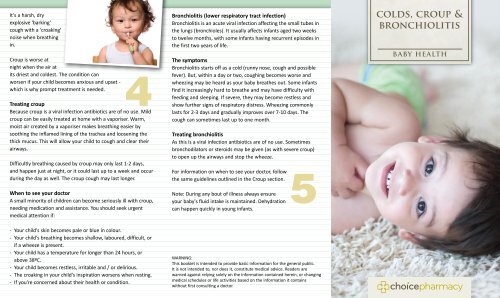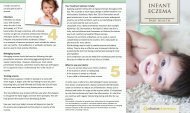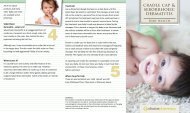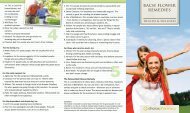colds, croup & bronchiolitis - Choice Pharmacy
colds, croup & bronchiolitis - Choice Pharmacy
colds, croup & bronchiolitis - Choice Pharmacy
Create successful ePaper yourself
Turn your PDF publications into a flip-book with our unique Google optimized e-Paper software.
It's a harsh, dry<br />
explosive 'barking'<br />
cough with a 'croaking'<br />
noise when breathing<br />
in.<br />
Croup is worse at<br />
night when the air at<br />
its driest and coldest. The condition can<br />
worsen if your child becomes anxious and upset -<br />
which is why prompt treatment is needed.<br />
Treating <strong>croup</strong><br />
Because <strong>croup</strong> is a viral infection antibiotics are of no use. Mild<br />
<strong>croup</strong> can be easily treated at home with a vaporiser. Warm,<br />
moist air created by a vaporiser makes breathing easier by<br />
soothing the inflamed lining of the trachea and loosening the<br />
thick mucus. This will allow your child to cough and clear their<br />
airways.<br />
Difficultly breathing caused by <strong>croup</strong> may only last 1-2 days,<br />
and happen just at night, or it could last up to a week and occur<br />
during the day as well. The <strong>croup</strong> cough may last longer.<br />
When to see your doctor<br />
A small minority of children can become seriously ill with <strong>croup</strong>,<br />
needing medication and assistance. You should seek urgent<br />
medical attention if:<br />
Bronchiolitis (lower respiratory tract infection)<br />
Bronchiolitis is an acute viral infection affecting the small tubes in<br />
the lungs (bronchioles). It usually affects infants aged two weeks<br />
to twelve months, with some infants having recurrent episodes in<br />
the first two years of life.<br />
The symptoms<br />
Bronchiolitis starts off as a cold (runny nose, cough and possible<br />
fever). But, within a day or two, coughing becomes worse and<br />
wheezing may be heard as your baby breathes out. Some infants<br />
find it increasingly hard to breathe and may have difficulty with<br />
feeding and sleeping. If severe, they may become restless and<br />
show further signs of respiratory distress. Wheezing commonly<br />
lasts for 2-3 days and gradually improves over 7-10 days. The<br />
cough can sometimes last up to one month.<br />
Treating <strong>bronchiolitis</strong><br />
As this is a viral infection antibiotics are of no use. Sometimes<br />
bronchodilators or steroids may be given (as with severe <strong>croup</strong>)<br />
to open up the airways and stop the wheeze.<br />
For information on when to see your doctor, follow<br />
the same guidelines outlined in the Croup section.<br />
Note: During any bout of illness always ensure<br />
your baby's fluid intake is maintained. Dehydration<br />
can happen quickly in young infants.<br />
<strong>colds</strong>, <strong>croup</strong> &<br />
<strong>bronchiolitis</strong><br />
baby health<br />
- Your child's skin becomes pale or blue in colour.<br />
- Your child's breathing becomes shallow, laboured, difficult, or<br />
if a wheeze is present.<br />
- Your child has a temperature for longer than 24 hours, or<br />
above 38ºC.<br />
- Your child becomes restless, irritable and / or delirious.<br />
- The croaking in your child's inspiration worsens when resting.<br />
- If you're concerned about their health or condition.<br />
WARNING:<br />
This booklet is intended to provide basic information for the general public.<br />
It is not intended to, nor does it, constitute medical advice. Readers are<br />
warned against relying solely on the information contained herein, or changing<br />
medical schedules or life activities based on the information it contains<br />
without first consulting a doctor.
During the winter months most families will be affected<br />
by the common cold. Colds are caused by viruses and<br />
spread by touch and droplets through the air, making it<br />
easy for the whole family to become infected.<br />
Don’t forget<br />
that because<br />
<strong>colds</strong> are caused<br />
by viruses, they<br />
can't be treated<br />
with antibiotics.<br />
Babies and young children are the most<br />
vulnerable to viruses because their immune<br />
systems haven't fully developed. Most of the<br />
natural immunity inherited from mum via<br />
the placenta is lost by the age of six months.<br />
Babies are often prone to <strong>colds</strong> during the<br />
first winter following this. As babies and<br />
young children grow older, their immunity<br />
matures and they usually catch less <strong>colds</strong><br />
and infections.<br />
The average child has between four and twelve upper<br />
respiratory tract infections a year. With the peak incidence<br />
between the ages of one to six years old.<br />
Because <strong>colds</strong> are caused by viruses, they can't be treated<br />
with antibiotics. The only way to treat a cold is to address its<br />
symptoms and let the body's own immunity fight off the virus.<br />
The signs and symptoms<br />
Symptoms of a cold may include sneezing, watery eyes, dry<br />
irritable cough, slightly raised temperature, watery runny nose<br />
or blocked stuffy nose. In babies and infants a blocked nose<br />
can be extremely distressing, as they find it difficult to breathe<br />
through their mouths. This is especially so at feeding time,<br />
because a baby can't suck and breathe at the same time.<br />
Your baby's usual feeding pattern will generally become<br />
disrupted. They may<br />
be unsettled, irritable,<br />
tired or lethargic. Allow<br />
your baby to take as<br />
much milk or fluids as<br />
they can. Solid foods<br />
become of secondary<br />
importance.<br />
Mucus may sometimes be seen in your baby's vomit and even in<br />
their bowel motions (as babies can't blow their noses the mucus<br />
is swallowed and digested). This is quite normal, but if you notice<br />
blood with the mucus see your doctor immediately.<br />
Having a cold can lower the body's immunity, making it vulnerable<br />
to secondary infections, like middle ear infections, tonsillitis or<br />
bronchitis. These all require medical attention.<br />
When to see your doctor<br />
You should see your doctor if:<br />
- Your baby has a temperature over 38ºC, or lasting longer than 24<br />
hours.<br />
- Your baby has a persistent cough, or a cough that becomes moist<br />
and rattly.<br />
- Your baby's nasal mucus becomes thick, yellow or green in colour.<br />
- Your baby's cold lasts longer than a week, or worsens.<br />
- You're concerned about your baby's health and condition.<br />
- Your baby is having any difficulty breathing or if there is a wheeze<br />
present.<br />
Treating the symptoms<br />
- Clean your baby's nostrils before each feed, using a small<br />
piece of cotton wool slightly moistened with warm water.<br />
- A Paediatric Nasal Aspirator can be used to remove<br />
excess nasal mucus.<br />
- Fess Nasal Spray can be used as often as necessary. Fess is a<br />
buffered saline spray. Because it's not medicated it's<br />
safe to use from birth. Fess will help to dislodge and thin<br />
nasal mucus, allowing your baby to breathe easier.<br />
- Raise the head of the bassinette by placing a rolled towel<br />
underneath the mattress. Only make the bed half way up<br />
from the bottom so your baby will not slide under the covers.<br />
- Use a vaporiser, especially at night, to moisturise and warm<br />
the air. The soothing medicated steam will help unblock the<br />
nose and make breathing easier.<br />
- Paracetamol can be given to lower any raised temperatures<br />
and ease irritability. Never exceed the recommended dose.<br />
- Dimetapp / Demazin / Paedamin may be given, with your<br />
doctor's advice, to dry up nasal secretions.<br />
- If your baby has a cough, it's best not to suppress<br />
it. Coughing is the body's way of keeping the chest<br />
clear of mucus. Very few cough suppressants or<br />
expectorants are suitable for children under two<br />
years old.<br />
Croup<br />
Croup is an infantile form of laryngitis. It is usually caused by a<br />
virus and is most common in cooler conditions. This infection<br />
causes inflammation of the larynx (voice box) and trachea<br />
(windpipe) by creating thick mucus that narrows and blocks the<br />
airways.<br />
Croup usually affects young children under three years old,<br />
because of their small, soft, immature windpipes.<br />
The symptoms<br />
The symptoms usually start off with a sore throat, followed by a<br />
decreased appetite and possible temperature. A cough will then<br />
develop. The characteristic <strong>croup</strong> cough sounds very frightening.





